- Home
- Michael McBride
The Fall Page 3
The Fall Read online
Page 3
Some baseball game played on the tube to her left behind the door. She debated turning it off, but didn’t want to wake him. Not if he was comfortable and sleeping. These moments were precious to her. It caused her physical pain to see her father lying on his back with tears in his eyes as he couldn’t find a comfortable position for more than a few seconds since inevitably, however he stretched out, he was putting pressure on one injury or another. So, with a nod to herself and a sad smile, Evelyn closed the bedroom door and crept down the hallway to her bedroom.
Porcelain unicorns and stuffed animals lined the shelves on the wall from her youth, interspersed with theatrical posters she had bought from the guy at the video store in town after they were through using them, running the gamut from “The Goonies” to “Prizzi’s Honor.” Her old single bed sat beneath a pair of shelves supporting an old stereo and her small collection of CDs, complete with the same quilt that had adorned the bed since she was eight years old. Lately, though, she had taken to passing out atop it in the same clothes she had worked in all day, barely messing it as she slept, still with exhaustion.
She didn’t even need the overhead light anymore; it had burned out months prior regardless. The entire room was lit day and night by the high-intensity sodium halide lights in little silver domes, strung from the ceiling to hang above the seventy-five gallon fish tank in the middle of the floor. Pumps whirred and filters churned, connected by plastic hoses over the lip of the tank. A mud-filled refugium sat beside the tank, growing tall stalks of red mangrove, which leeched the nitrates and phosphates from the constantly circulating system.
“How are we doing tonight?” she asked, dropping to her knees, then lying on her stomach. She propped her chin on her hands.
Inside the tank, long greenish-brown leaves of kelp wavered side to side at the whim of the current produced by the constant influx of filtered saltwater. They took up nearly every inch of space on the floor of the aquarium, planted into a sandy medium she had procured from a hydroponics store on her last trip to the coast. Miniature blue- and red-legged hermit crabs sifted through the sand, aerating the roots.
“Someday,” she whispered, tapping on the glass.
Closing her eyes, she drifted weightlessly into unconsciousness, knowing full well that her “someday” might never come.
III
East of Bethlehem, Pennsylvania
PHOENIX CLOSED HIS EYES IN PREPARATION OF WHAT HE KNEW WAS TO COME. The woman had told him they would be coming. This was octavusdecimus dies, she had called it, his eighteenth birthday. He could hear them beyond the heavy wooden door, shuffling expectantly back and forth, crammed shoulder to shoulder in the tight hallway amidst the crumbling plaster and betrayed framework. Their breathing was always heavy, always creeping beneath the doorway across the faded sealant on the concrete floor, reeking of despair, heated by their fervor. This was what he both desired and dreaded the most. To be among other people, to have physical contact of any kind, to for just a fleeting moment feel as though he was loved and special, but that feeling would quickly be erased as they crammed in around him, all of them reaching for him, tugging at his bare skin, moaning and pleading for him to touch them, to spare their bodies from the evils that ravaged them. And when they finally left, he felt as though every ounce of blood had been drained from his body, every inch of flesh torn away, leaving him little more than the festering bones housing what little of his life force remained to begin the process of rebuilding his humanity.
The Swarm, as he had come to think of them, scratched at the wood from the other side of the door. He could imagine it carved into a million grooves, ribbons of twisted wood peeled back and littering the floor atop the tatters of fingernails ripped from the bloodied fingertips, tracing parallel lines all over the walls.
He would never know for sure though, as the only times they ever took him from this damp cellar, he was bound and blindfolded and carried so as not to even place his feet on ground that may not have been blessed to purity. Being blindfolded was really no different than being in this room all the time. Seeing nothing but blackness was a nice change to the rattling pipes on the walls, rusted and staining the concrete walls with orange patterns that crept toward the condensation on the floor. The room was lit by a solitary light bulb, which cast an antique brass glare over everything. He fancied that in that light, the straw they used for his bed looked like spun gold.
His only real friends were the enormous black flies that buzzed around the rusted bucket in the corner where he relieved himself, by now no longer even smelling his refuse as he was so accustomed to being near it. All he knew was that the woman came every day to take the bucket, though he knew not exactly what she did with it, but when she returned it was always empty and reeked of stagnant water as though she had rinsed it in a lake. He imagined that lake with a thin skein of green growth rimming the edges, feeding the multitude of ducks and geese that nested in the cattails. The sun always glimmered from gentle ripples where fish leapt out of the depths, shimmering with scales like mirrors, before splashing back down as though they had never even existed, leaving the mystery of their genesis spreading out in ever-expanding concentric circles.
That thought always made him smile.
Sometimes there would be turtles sunning themselves on driftwood and doves mourning in the trees. Other times there would be a doe and her spotted fawn drinking from their own shimmering reflections while red-tailed hawks and golden eagles circled high above, screaming down to taunt the fish to rise for their meals. And still there were times when he pictured the woman crouching on the bank, sloshing the vile, larvae-riddled water in that rotting bucket, dumping and refilling it to remove his excrement. The lake was the color of mud, carcasses of decomposing fish rimming the shore, the turtles snapping the flesh from the furry, maggot-softened remains of the glass-eyed fawn, while cottonmouths skated across the water toward her through the cattails.
In those times, he felt afraid. Not for the woman, but for himself. It was wrong to wish her ill, for she was the one who brought his bread and oats, who gave him her own warm milk to drink from the wooden chalice. Yet still, he prayed that when the stomping would begin above, when The Swarm started flailing around on the hardwood floor, convulsing with The Spirit, that the ceiling above would give way and bury him beneath the cracked concrete shrapnel, but then he could see the lake reflecting the startling blue skies and the purple mountains that held them aloft, the blaze of autumn aspen spreading through the forest around him, and could almost taste fresh sap on the breeze and feel the warmth of the sun on his outspread arms.
That was enough.
It had to be.
There was nothing else.
Sometimes he could find his friends during the night while he was sleeping. Sometimes he could even see the world through their dreams. He knew there was more outside of this cellar, or the one before, or the string that preceded that cell. He knew all about mothers and fathers and brothers and sisters and grandparents and friends and lovers, though the realization that such things existed beyond his little room was often more than he could bear. He wished for a mother to stroke his cheek and dry his tears; a father to clap him on the shoulder and beam with pride; a girl his own age to hold his hand between her own and steal him into her soft eyes. Instead, there was the shrouded woman, who covered every inch of her flesh but her hands and feet, her face hidden behind her flaccid black hair, and the man with the white square on his collar, who never spoke directly to him, but always brought The Swarm.
Phoenix didn’t know whether he was attractive or not, or even what he looked like, for he had only ever seen himself through the eyes of The Swarm, and to them he looked like a filthy rag soaked with mud and refuse, long hair in clumped strands, cowering in the dirty straw like one of the mice that scurried from the darkness to greedily take the pinches of bread he spared for them and run back into the crawling darkness.
Nothing there was his.
Not even his name.
The Swarm called him Messiah and Lord, though he much preferred the name Phoenix, which he had heard numerous times in his former home, the sweltering basement like a kiva into which all manner of hairy spiders and whip tailed scorpions materialized to torment him.
There was a brief sparkle of light from the doorknob as it twisted.
The loud thud of the bolt being withdrawn.
The jangle of the length of silver chain.
The clatter of snapping latches.
He closed his eyes and stretched out on the straw as he knew he was supposed to: arms stretched out to either side, palms to the ceiling; legs straightened, one foot balanced atop the other; naked but for the crusted dirt and filth.
Bare footsteps slapped across the cement, heading straight toward him. Voices cried out as several were felled before the onslaught and trampled beneath the others in their hurry to touch him. He was surrounded by their rasping breaths and the all-consuming stench of disease. Hands grasped at him, poking him, scratching him, caressing him, leeching his essence through his pores like filings being drawn to so many magnets. They wailed and moaned and floundered in ecstasy, waves of human flesh writhing all around him.
Tears streamed down his cheeks, but he refused to allow a whimper to part his quivering lips. He felt like they were peeling away his flesh one strap, one severed muscle, one snapped tendon at a time.
“Lay your hands!” the man with the white on his collar shrieked over the din. His square teeth were decayed to the texture of wood, his tangled silver hair framing a face like melting wax with deep-set, hollowed eyes. “Lay your hands on the Caulbearer, the Prophesied One!”
Eager fingers crawled over his skin like so many spiders and Phoenix thought of the lake with the deer and the turtles and the sun and the fish…
“Lay your hands on the Son of God!” the man raged, his voice cracking to a shrill wail. “The Second Coming of the Christ!”
…and the purple mountains and the cattails and the ducks, but as it always seemed to, the darkness obliterated the image and drew him into its black heart where there were only the tearing fingers and the oily film of disease that formed on his flesh.
“Come and be healed!” the man screamed with the last of his voice, chasing Phoenix’s mind from the terror of his flesh.
* * *
Even in his dreams, he could never see her face. Maybe it was his fear that to do so would somehow lessen her magic, or maybe it was because that so long as he didn’t have to see her, she wouldn’t be able to see what had become of him.
The woman had told him several times, always from a distance, always from the shadows as though if he could not see her, he would be unable to pass judgment, but rather hear her confessions from afar. Her eyes were always there, though her frock would match the darkness precisely, irises as brown as a diseased liver, streaked with green like bile from a ruptured gallbladder.
“You were born beneath God’s Veil,” she would say, her voice a whisper, furtively glancing toward the floor above at every creak of the settling house. He knew the sounds of the house dying around him. It spoke to him, but the woman didn’t know the language. She was listening for the man’s footsteps, he knew. To Phoenix, the man’s tread sounded like hammers being slammed against the floor above, like hatchets driven into the sides of his skull, the metered beat of his own demise. “His thumbprint was upon your face. The chosen. I saw it with my own eyes as I was there when you were delivered. I was the one who tore the holes through the caul with my own teeth to keep you from suffocating, who ripped the seal over your mouth so you could draw the breath to cry, and who eventually pried the congealed mask of flesh from your face, the loops from around your ears.”
He hardly ever spoke while she was talking, hoping she would betray just a little more of the story; a hint, a single word that might one day lead him out of this cellar and into his mother’s arms again, wherever she was…
“We knew you would be coming. The signs were easy to follow once we knew what we were looking for. They led us to several before you, though all were stillbirths, delivered both from and to the grave. But we knew when we found your mother that she had been the one we were looking for all along. It positively resonated from her like a struck tuning fork, making it so that the world itself shivered against her presence. As The Father had promised, as he had prophesized, we found her in the City of Angels, though cast far from His good graces into the very heart of purgatory. Pocked and scarred, she delivered you into my hands in an alley behind Sodom, amidst the screams of the dead and dying. She delivered you to us, our light, our savior, while the rest of God’s Children knelt around us in prayer.”
“Is the man upstairs God?” Phoenix had asked once.
“No,” she had said, the only time he had ever seen a smile in her eyes. “He is God’s servant, a shepherd, a prophet. God speaks through him, gathering His sheep into the fold so that we may commune with Him through His only son.”
She loved him. He was sure.
Then why did she steal him from his mother and lock him in these dreary confines?
If he was God’s son, then where was his father? Certainly not down there in that rank cellar to hold his hand when he was scared or warm his prickled-skin when he was cold.
Only The Swarm came to see him in the dark.
Only The Swarm touched him.
Only The Swarm.
That night he dreamed of the hum of a million insects, vibrating the very floor of what he assumed would one day be his tomb, while myriad voices screamed in cacophonous horror above.
That dream eventually bled into another, where he sat at the edge of a crystalline stream, his bare feet pruned beneath. Another pair of slender, pearl-white legs splashed beside him. He felt a warm hand slip into his own, his heart accelerating like a hummingbird’s wings. He looked to the right, blinded by the sun behind her, her face bathed in shadow.
“More man tears,” she whispered.
Even though he couldn’t see it, her smile radiated more warmth than the fiery orb behind her.
* * *
He awoke on the heap of defiled straw with a blissful smile on his face, though, for the life of him, he wasn’t sure which dream had caused it.
IV
Northern Iran
“GET ON THE TRUCK!” KELLER SHOUTED, LEAPING FROM THE DRIVER’S SEAT of the tan transport vehicle and sprinting around to the back to open the gates, leaving the door wide and the engine running. The enlarged bed was framed with an aluminum infrastructure, canvas roped around it so it looked like a moving van. He had backed it right up to the line of tents.
The sand blew sideways on the rising wind, muting the darkness.
“Go! Go!”
The more ambulatory patients were the first to their feet, crowding around the rear of the truck while Keller tied back the canvas flaps. They clambered over the gate and scurried toward the front, standing up and packing themselves forward like sardines cramming themselves into a can. None of them spoke, as all knew what was transpiring around them and how fortunate they were that they weren’t being left behind in the camp. Holding bloody gauze to foreheads and shoulders, arms and legs in slings and makeshift casts, they pressed back as far as they could to make room for as many more as possible.
“You go first!” Adam yelled, shoving the woman toward the truck’s gate, then giving her a solid boost from behind. As soon as the woman clambered to her feet, he passed her daughter to her. “Get up against the side so you can still get air!”
With a final shove, he propelled her toward one of the sides where the canvas was seamed together, coughing out a lungful of the black smoke churning from the tailpipe, then sprinted back toward the tent.
“Newman!” Kimball barked, the radio and laptop stacked across his arms, cords trailing around his legs. “Get on that truck!”
“There are still patients!” Adam screamed.
“We save the ones we can!” Kimball shouted over the patter
of sand hammering the tent. “The rest can fend for themselves!”
“Not in their condition! We’d be leaving them to die!”
“They’d have died already if it weren’t for us!”
“We can’t leave them!”
“We can and we will, soldier! Now, get on the truck! That’s an order!”
“Yes, sir!” Adam snapped, his stare locked contemptuously on his commanding officer.
Kimball held his gaze a moment, before finally turning and heading out of the tent.
As soon as Kimball turned, Adam sprinted back into the tent.
Lieutenant Kimball clambered up into the driver’s seat of the truck, setting the communication devices carefully on the seat next to him, while still leaving enough room for a passenger. Sighing tersely, he rubbed the grains of sand from his eyes and pounded his fist onto the horn.
He looked to the side mirror, but could only see various bodies pressing into each other to try to force their way onto the truck through the thick black exhaust and the blowing sand. The entire cab bounced gently with the transfer of weight from the tailgate to the bed.
He triggered the windshield wipers, dragging twin arcs through the dust.
Something moved through the sideways blowing sand like a specter through the mist. He leaned forward, squinting to try to make out the details. Whatever it was appeared to be the same color as the desert sand, flirting in and out through the dust storm, a mere shade of gray apart from the black night. Slowly, he was able to decipher a vague impression of the outline.

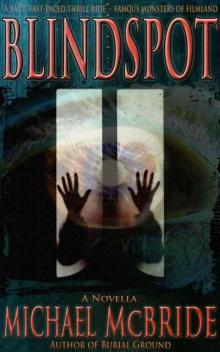 Blindspot
Blindspot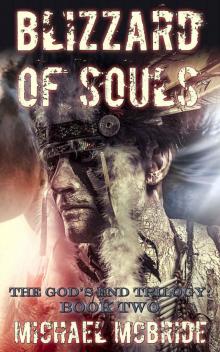 Blizzard of Souls
Blizzard of Souls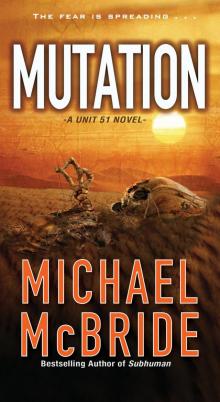 Mutation
Mutation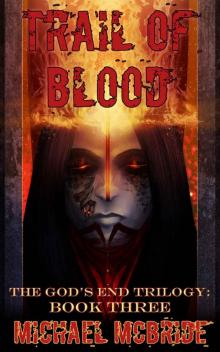 Trail of Blood
Trail of Blood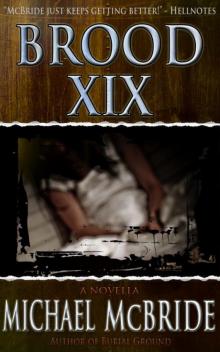 Brood XIX
Brood XIX The Fall
The Fall Snowblind II: The Killing Grounds
Snowblind II: The Killing Grounds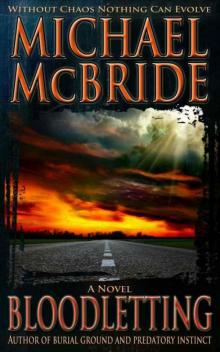 Bloodletting
Bloodletting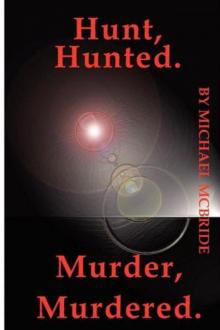 Hunt Hunted, Murder Murdered
Hunt Hunted, Murder Murdered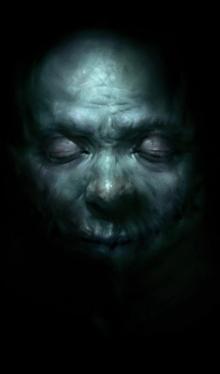 The Bloodspawn
The Bloodspawn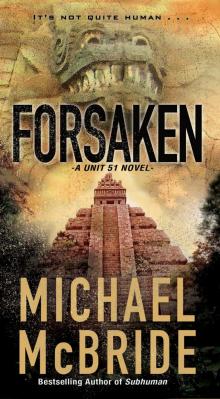 Forsaken
Forsaken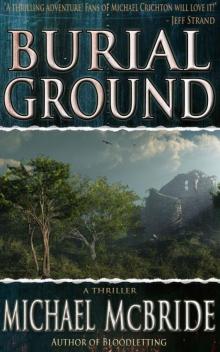 Burial Ground
Burial Ground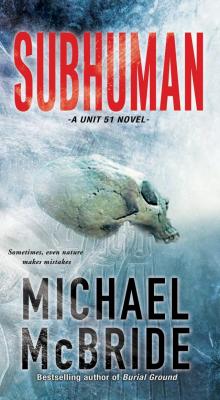 Subhuman
Subhuman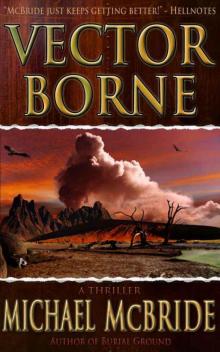 Vector Borne
Vector Borne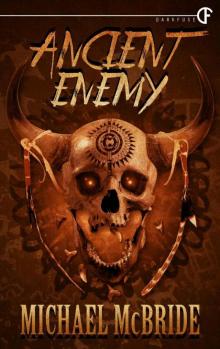 Ancient Enemy
Ancient Enemy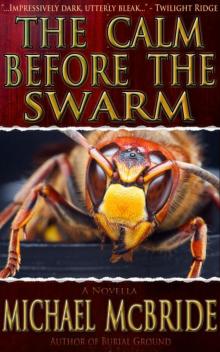 The Calm Before The Swarm
The Calm Before The Swarm Innocents Lost
Innocents Lost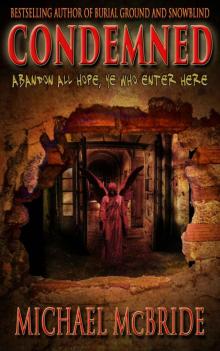 Condemned: A Thriller
Condemned: A Thriller